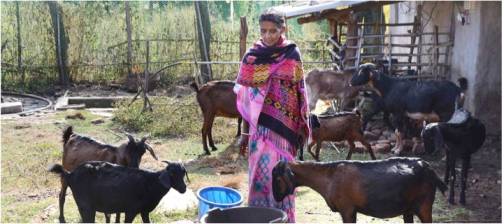In Agra village, about 45 km from Ranchi, Janu Devi, 27, dressed in her blue sari uniform, is excited about the ice box she has just received. She’s one of five pashu sakhis (friend of the animals) in Jharkhand’s Tamar block office to get the box that stores vaccination vials for goats, poultry, and pigs.
Ms. Devi is part of a team of about a thousand women across all 24 districts of Jharkhand, recruited since October 2013, for last-mile coverage of livestock management.
These women, formally called community animal care service providers and informally known as ‘doctor didis’, go door to door when called. They advise farmers about health check-ups for their livestock, vaccinations, de-worming, hygiene, breeding, feeding, and the management of animal waste.
The project, conceived under the National Rural Livelihoods Mission, was taken under its wing by the Jharkhand Opportunities for Harnessing Rural Growth in 2017-18 and the World Bank began funding it. World Bank data suggest there are now up to 57,000 farmers who benefit.
Dip in mortality rate
“With the help of the pashu sakhis, the mortality rate of goats has come down by about 30%, and of poultry by 40%,” said Pravin Singh, a senior official in the Jharkhand State Livelihood Promotion Society, a unit of the State’s Agriculture department.
The pashu sakhis are put through a three-level 30-day training programme over seven-day tranches on how to take care of poultry, goats, and pigs. About 30 pashu sakhis have also been trained with 45 days of additional training in livestock management. These are the master trainers.
“Up to 70% of those trained have been certified by the Agriculture Skill Council of India, which guarantees a high common standard of services,” said Tapas Ranjan Behera, the State’s head for skills, jobs, and enterprise.
Source : The Hindu Jan 15th 2023

